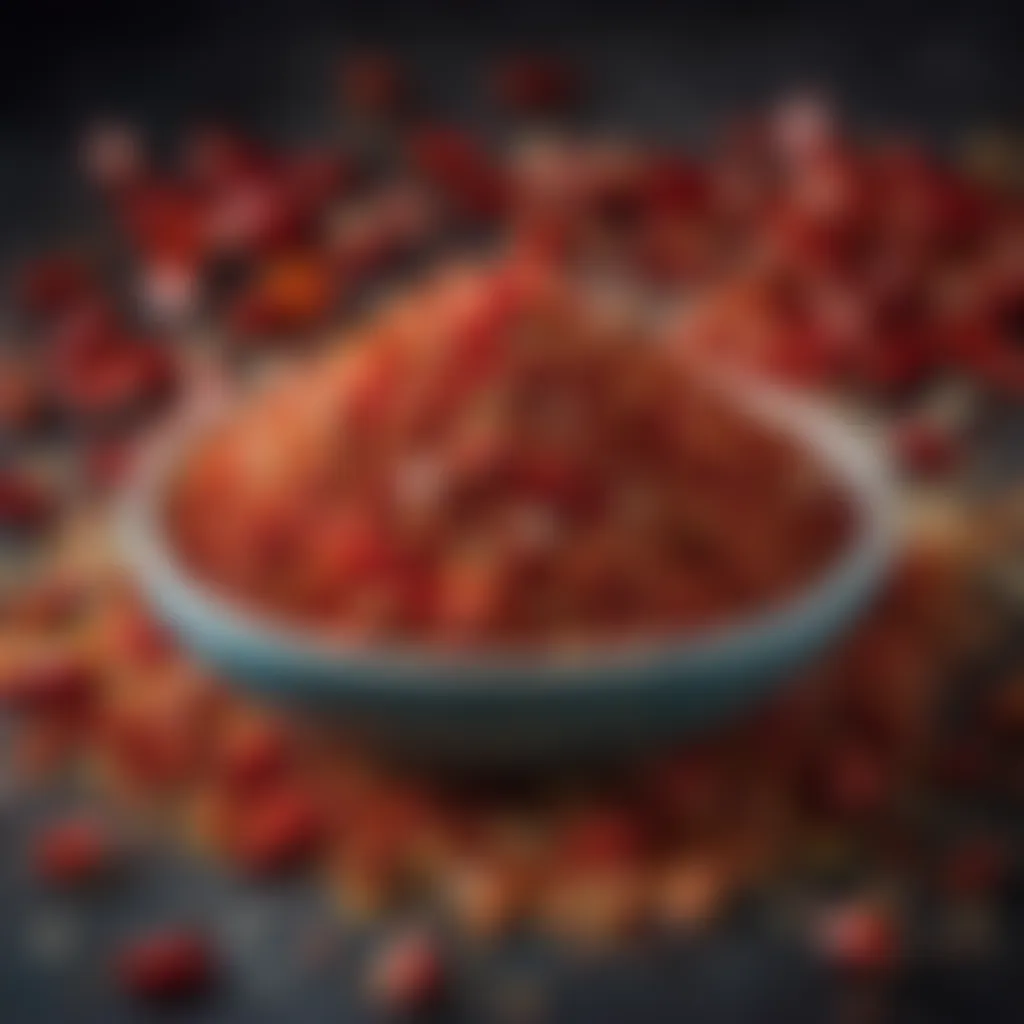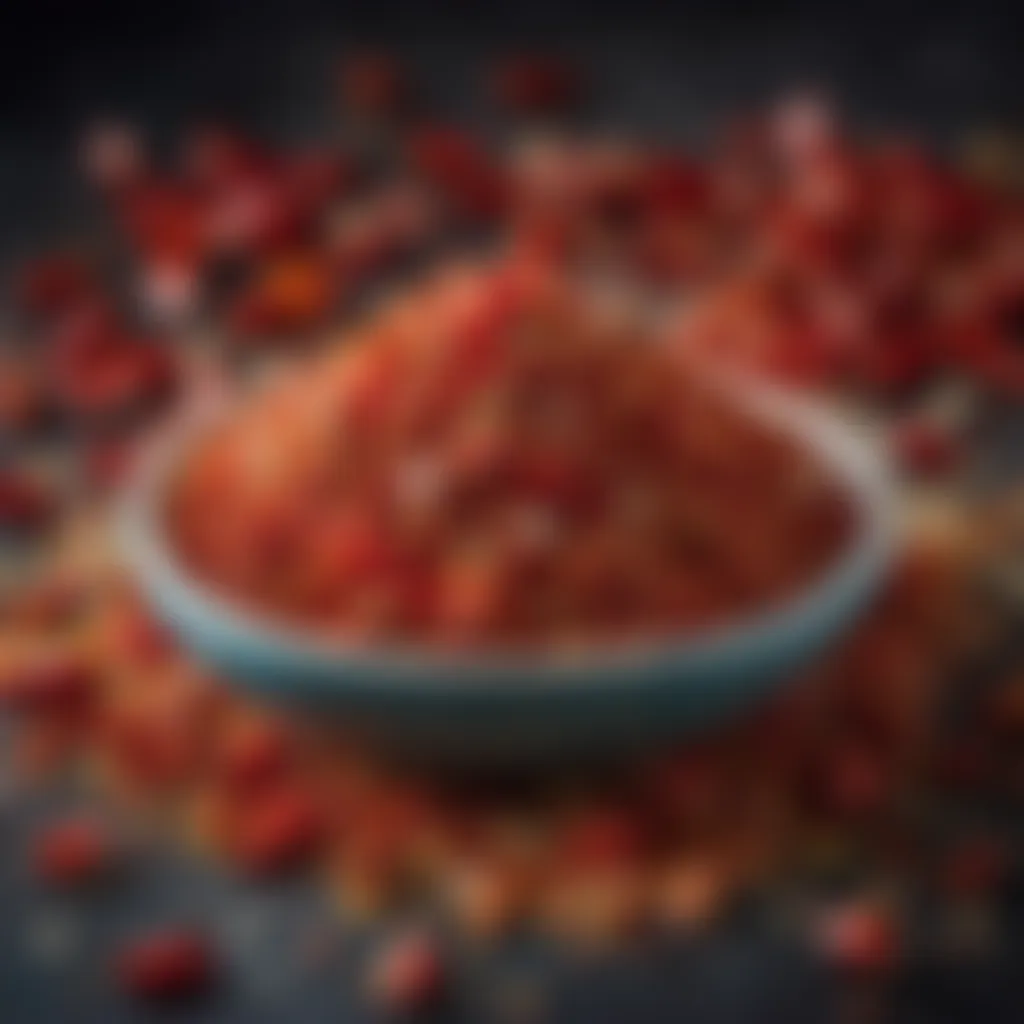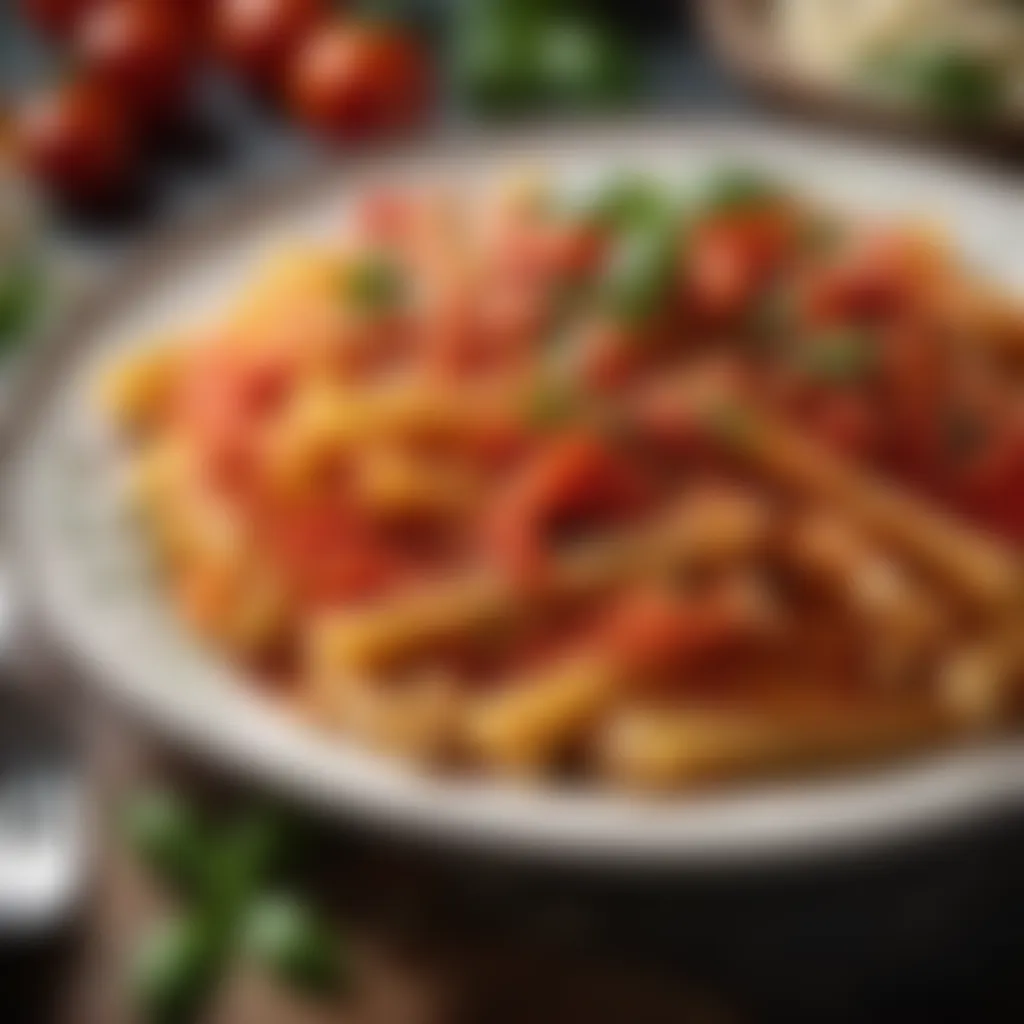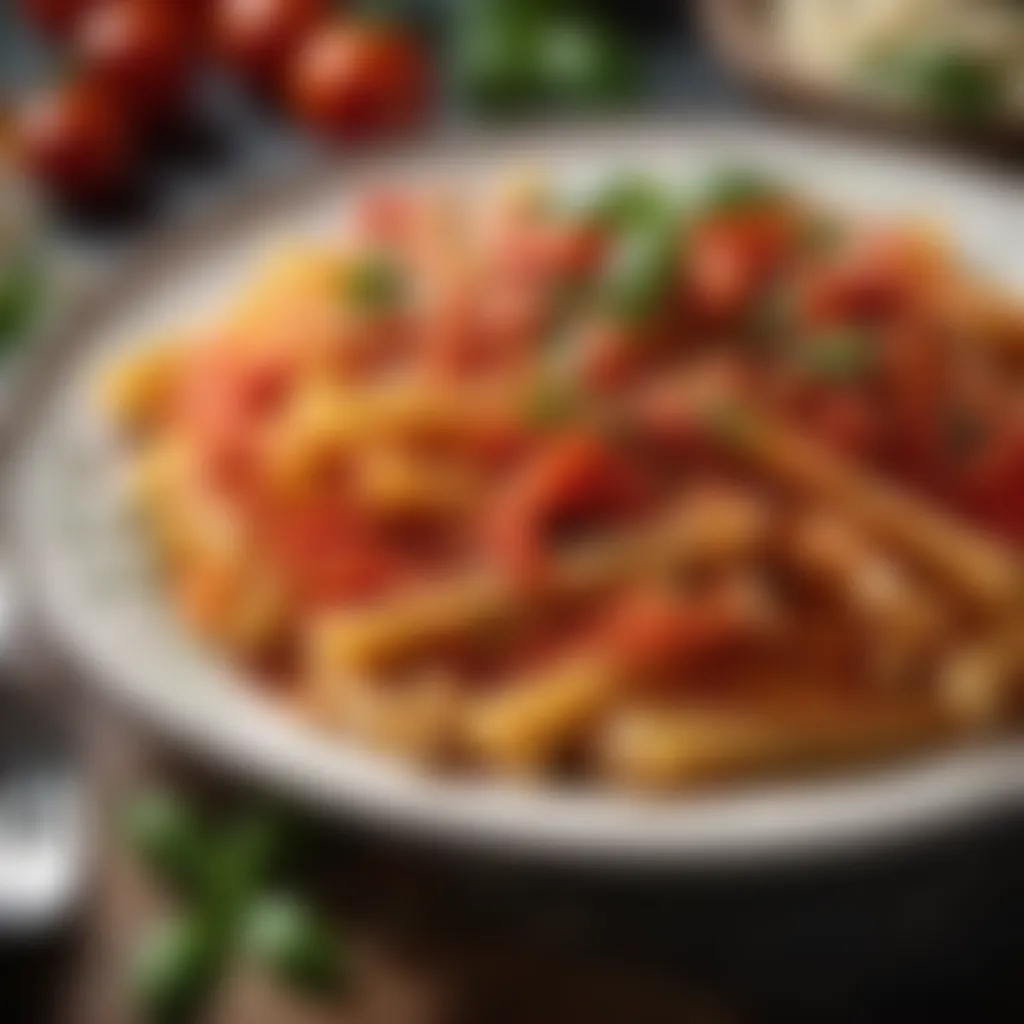Authentic Arrabiata Recipe: A Spicy Italian Classic


Intro
Arrabiata sauce, with its spicy kick and rich flavor, brings the heart of Italy right to your kitchen. Originating from the Lazio region, particularly Rome, this dish is known for its boldness and simplicity. The name itself means "angry" in Italian, a nod to the heat from the chili peppers that sets your palate ablaze. Whether you're preparing a cozy dinner for your family or hosting friends, mastering the authentic Arrabiata recipe can elevate any meal.
Here, we will guide you through each step, from gathering essential ingredients to enjoying the delightful final dish. You'll discover not just how to make the sauce but the artistry behind it, ensuring that every spoonful is a taste of Italy.
Ingredients:
To create the genuine Arrabiata sauce, you’ll need a handful of straightforward, high-quality ingredients. Here’s what you should gather:
- 350 grams of penne pasta
- 4 tablespoons of extra virgin olive oil
- 3-4 garlic cloves, minced
- 400 grams of canned San Marzano tomatoes, crushed
- 1-2 teaspoons red chili flakes (adjust to your spice tolerance)
- Salt to taste
- Freshly chopped parsley (for garnish)
- Grated Pecorino Romano cheese (optional, for serving)
These ingredients all play a vital role in achieving that authentic taste. The tomatoes provide a rich base, while the chili flakes deliver the signature heat. The quality of olive oil can make a significant difference, so choose one that you truly enjoy.
Preparation Steps:
Now that you have your ingredients ready, let’s roll up our sleeves and dive into the cooking process.
- Prep the Tomatoes:
If using canned San Marzano tomatoes, crush them in a bowl, releasing their juices. If fresh tomatoes are preferred, blanch them, peel, chop, and crush. - Mince the Garlic:
Take 3-4 garlic cloves and crush or finely mince them. The garlic stands out in this dish, so don’t skimp on it. - Cook the Pasta:
In a large pot of salted boiling water, add the penne pasta and cook according to package instructions until al dente.
Drain the pasta, reserving about a cup of the pasta water for later. - Prepare the Sauce:
In a large skillet, heat the olive oil over medium heat. Add the minced garlic and sauté until fragrant but not brown—about 30 seconds to 1 minute.
Toss in the red chili flakes and stir for a few seconds to infuse the oil with spice. - Add Tomatoes:
Pour in the crushed tomatoes. Stir well, and allow the sauce to simmer for about 15-20 minutes, letting the flavors meld. You might want to add a bit of salt to enhance the taste. - Combine Pasta and Sauce:
Once the sauce thickens, add the drained pasta directly into the skillet. Toss well, ensuring each piece of pasta is coated in the spicy sauce. If the dish looks too dry, add some reserved pasta water a little at a time until you reach the desired consistency. - Final Touches:
Remove from heat and sprinkle with freshly chopped parsley. If desired, serve with grated Pecorino Romano cheese for an extra layer of flavor.
Technical Aspects:
When cooking Arrabiata, timing and temperature are key. Here are some specifics to keep in mind:
- Temperature: Keep the skillet at medium heat for sautéing garlic. Too high heat can burn the garlic, ruining the sauce.
- Timing: Aim for a 15-20 minute simmer for the sauce. This allows the tomatoes to cook down and develop rich flavors.
- Pasta Cooking: Don’t forget to check the pasta frequently, as various brands might have different cooking times.
Cooking Process:
Bringing these elements together produces a dish that is fiery yet comforting. Following the preparation steps carefully will lead you to a delightful result:
- Heat olive oil in a skillet.
- Sauté garlic until fragrant.
- Add chili flakes, then crushed tomatoes.
- Simmer for 15-20 minutes.
- Toss in cooked pasta and mix thoroughly.
- Garnish and serve.
"A good sauce is a foundation of great cooking." - Anonymous
Troubleshooting Tips:
Even the best of cooks encounter hiccups. Here are some solutions to common missteps:
- Too Spicy: Add a little sugar or more tomatoes to tone down the heat.
- Sauce Too Thick: Stir in reserved pasta water in small increments.
- Flavor Flat: Boost flavor with more salt or a tablespoon of good-quality balsamic vinegar.
With this guide, you’re all set to whip up a plate of authentic Arrabiata. Savor the flavors, embrace the process, and enjoy this Italian delight every step of the way.
Prelims to Arrabiata
Arrabiata is not just another dish in the Italian culinary landscape; it represents a vibrant slice of Italian culture and tradition. This section serves as the gateway to understanding what makes Arrabiata a beloved classic among spicy Italian delights. It lays down the foundational elements of this recipe, bridging the historical roots, cultural significance, and the spicy allure that captivates both home cooks and food enthusiasts alike.
Historical Context
The origins of Arrabiata can be traced back to the Lazio region, with its capital being Rome. Historical records suggest that the dish emerged in the mid-20th century, although its roots could be deeper, burrowed within the rustic kitchens of Italian communities who loved bold flavors. What’s remarkable is that 'Arrabiata' literally translates to "angry" in Italian, possibly referring to the fiery nature of the chili peppers used in the recipe.
Interestingly, the dish was often categorized as "poor man's food," utilizing simple and available ingredients, making it accessible to the working class. The folks in Rome didn’t have much, but they made the most of what they had in their kitchens. Many believe that a true Arrabiata reflects the essence of home-cooked meals within the bustling urban life of those days.
Cultural Significance
Culturally, Arrabiata has transcended its roots, becoming a symbol of Italian cuisine that embraces both regional pride and family unity. It’s a dish that resonates joy and warmth around the dining table, bringing families together. Think of it as the kind of meal you whip up when friends come over, or even on a quiet evening, where the smell of garlic and chili hangs in the air, igniting conversations and good times.
Additionally, the dish has piqued the interests of culinary explorers worldwide. It’s embraced not just in homes but also in restaurants that aim to offer an authentic taste of Italy. With variations appearing across the globe, it stands testament to how a simple recipe can evolve while retaining its core identity.
In sum, Arrabiata is not merely about its ingredients or sauce; it embodies a rich history and a profound cultural significance for many. It opens the door to exploring flavors that ignite passion, echoing tales of family traditions and culinary creativity.
Defining Features of Arrabiata
The defining features of Arrabiata sauce set it apart from many other Italian sauces. Understanding these elements is crucial, not just for crafting the dish, but for appreciating its complexity and character. At its core, Arrabiata is about a lively blend of flavors. The spice, the vibrancy of tomatoes, and the robust aroma of garlic work in harmony, ensuring that every plate tells a story. This section is meant to shed light on the essential components that lead to a perfect Arrabiata, enabling home cooks to replicate this classic dish with both care and creativity.
Spiciness Defined
The hallmark of a great Arrabiata lies in its heat. Spiciness is not just an afterthought; it is the backbone of this recipe. The heat typically comes from red pepper flakes, which infuse warmth and intensity into the sauce. It’s important to note that each cook can tailor the heat level according to their preference. Whether it’s a light scald or a fearless burn, understanding how to balance the spice with other flavors is key.
The beauty of Arrabiata is that it doesn't just celebrate heat; it does so while maintaining a rich tomato base. Here lies the art of achieving that perfect spicy harmony, allowing the diner to enjoy the dish's depth without being overwhelmed by the heat.
Ingredient Profile
Tomatoes
Tomatoes are the canvas upon which the magic of Arrabiata is painted. They contribute not only flavor but also texture and color to the dish. Ripe, in-season tomatoes bring a natural sweetness and acidity that are vital for creating depth. When choosing tomatoes, opt for San Marzano or Roma varieties. These are known for their richness and meaty texture, which help to form a thick sauce that clings wonderfully to pasta.
Their flavor plays a critical role, creating a balanced backdrop for the spicy notes without stealing the show.
Garlic
Garlic is undeniably the aromatic hero of Arrabiata. Its strong, pungent flavor mellows with cooking to develop a sweet, warm quality. The key here is to sauté the garlic just right—golden brown is the aim, as overcooking can lead to bitterness. Freshly minced garlic is preferred over its dried counterpart. Its health benefits, including immune-boosting properties, also make it a popular choice in many cuisines.
Red Pepper Flakes
Red pepper flakes are the spice of life when it comes to Arrabiata. They offer a quick, punchy heat that gets the taste buds dancing. The key characteristic of red pepper flakes is their versatility; one can easily adjust the amount based on personal preference. For those not accustomed to spice, starting with a pinch can ignite the sauce pleasantly without overwhelming the palate. They are an essential ingredient because other hot peppers may lack the balanced flavor that these flakes can provide.
Olive Oil
Olive oil plays a dual role in Arrabiata: as a cooking medium and a flavor enhancer. High-quality extra virgin olive oil enhances richness and adds fruity notes. It also helps to emulsify the sauce, giving it a silky consistency that’s a joy to eat. When selecting olive oil, look for one that is fresh and unrefined. Consider cold-pressed options for the best flavor. This ingredient not only elevates the overall profile but also ensures that each bite feels luxurious and hearty.
Parsley
Fresh parsley is the finishing touch to an authentic Arrabiata. Its bright green color and fresh flavor add a contrasting vibrancy to a rich, spicy dish. Chopped parsley scattered on top just before serving elevates the presentation and enhances the taste. Aside from being a visual garnish, parsley is valuable for cutting through the richness of the sauce, providing a refreshing uplift. That said, too much can overpower the dish, so it’s best to use it sparingly to enhance rather than dominate the dish's overall flavor.
"The right balance of spiciness, sweetness, and freshness creates an Arrabiata that sings on the palate and keeps you coming back for more."


Each of these ingredients contributes its unique notes to the final symphony that is Arrabiata sauce, achieving a delightful blend that's rich and complex. The marriage of flavors is what keeps this dish in the hearts and stomachs of many, perfect for those cozy nights in or gatherings with friends.
Essential Ingredients Breakdown
When it comes to making the perfect Arrabiata sauce, the essence lies within the ingredients. Understanding what goes into this fiery dish not only enhances flavor but also paves the way for authenticity. Choosing the right ingredients is a challenge that conveys the spirit of Italian cooking, promoting a harmony that captures both tradition and taste. Each component bears significance, directly tied to the essence of this classic Italian delight.
Choosing the Right Tomatoes
Tomatoes are the heartbeat of Arrabiata. They come in various types, but for an authentic taste, opting for San Marzano tomatoes is highly recommended. These plum tomatoes, grown in the rich volcanic soil of San Marzano sul Sarno, offer a sweetness and acidity balance that is simply unmatched. Not only do they elevate the flavor profile, but they also ensure a rich texture to the sauce.
Here’s why selecting the right tomatoes matters:
- Flavor potency: The deeper taste of San Marzano tomatoes lends a robust base, making every bite a delightful experience.
- Authenticity factor: Using traditional varieties strengthens one’s connection to Italian culinary customs.
- Culinary versatility: Well-chosen tomatoes can adapt to other dishes, adding value to your pantry staples.
To ensure maximum flavor, consider using canned San Marzano tomatoes if fresh ones aren't available. They retain their natural goodness and are oftentimes picked at the peak ripeness, sealing in the flavor.
Quality of Olive Oil
Olive oil is not just a cooking fat; it serves as a pivotal flavor enhancer in Arrabiata. The quality of olive oil you use can make or break the dish, so it’s essential to choose wisely. A robust extra virgin olive oil is ideal, as it contributes a peppery richness and enhances the overall taste of the sauce.
Consider the following points when selecting olive oil:
- Freshness: Look for oils with a harvest date; fresher oil retains its flavor and health benefits better.
- Origin matters: Olive oils from regions like Tuscany, Puglia, or even Greece have distinctive flavor profiles and can really elevate your sauce.
- Taste testing: Don’t hesitate to taste a few varieties before purchasing. Look for fruity notes with a hint of bitterness, which signify quality.
Here’s a tip: If possible, decant your olive oil into a dark glass bottle to protect it from light, which can deteriorate quality over time.
In the world of Arrabiata, the right ingredients are not just optional. They’re weapons in your culinary arsenal, ready to ignite flavor in every dish.
Through careful selection of tomatoes and olive oil, you prepare the foundation for an authentic Arrabiata sauce that honors Italian heritage and excites the palate.
Preparation Techniques
When it comes to crafting the perfect Arrabiata, the preparation techniques truly lay the groundwork for the dish's success. Each step in preparation is about more than simply following a recipe; it’s about understanding how each ingredient interacts and evolves throughout the cooking process. Mastering these techniques can elevate a good dish to greatness, engaging the senses and ensuring a delightful culinary experience.
Sautéing Garlic to Perfection
Garlic is the heart of Arrabiata, providing that unmistakable aroma and flavor. To achieve perfectly sautéed garlic, start with fresh cloves. Slice them thinly or chop them fine, depending on your preference. The key here is heat; using a medium flame allows the garlic to soften without burning. A minute or two should suffice. Keep an eye on it—it can go from golden to black quicker than you can say "Buon Appetito." Remember, burnt garlic can turn your sauce bitter. The fragrance will be a hint of what's to come, filling your kitchen with a delicious promise.
Cooking the Sauce
Creating a sauce that sings is paramount. This stage is where the magic happens.
Balancing Flavors
Balancing flavors is an art. In Arrabiata, you want spiciness, tanginess, and richness to play nice with each other. Start with your sautéed garlic and add canned tomatoes—opt for San Marzano if you can find them. Their sweetness offsets the heat from the red pepper flakes. It’s crucial to taste as you go, adjusting for salt and possibly a pinch of sugar to counter the acidity. This back-and-forth of flavors enhances the overall dish, making it complex yet satisfying.
- Key Characteristic: Balancing flavors allows the dish to maintain a lively profile while preventing any single element from overpowering the others.
- Unique Feature: You can experiment by adding a splash of red wine or balsamic vinegar for depth.
Remember, every chef’s touch can leave a mark on the final product. Taste as you go and adjust accordingly.
Simmering Techniques
Simmering is not just about waiting; it’s an essential step for developing the sauce's body. Lower the heat after adding your ingredients; a gentle simmer will allow all the flavors to marry beautifully. This technique helps in thickening the sauce as it loses excess water, concentrating the flavors. Aim for about 20-30 minutes of simmering, stirring occasionally to prevent sticking.
- Key Characteristic: This method intensifies the dish's flavor while ensuring a smooth texture.
- Unique Feature: The slow cook allows for deep integration of spices and herbs, creating a rich profile that defines a good Arrabiata.
In sum, these preparation techniques are what bring the dish to life. Each step melds together the essence of Arrabiata, from the delicate sautéing of the garlic to the harmonious simmering of the sauce. Understanding and mastering these elements is key to crafting an unforgettable Italian dish.
Cooking Pasta for Arrabiata
Cooking the pasta properly is crucial in creating an authentic Arrabiata dish because it directly affects both the texture and overall enjoyment of your meal. You could have the most perfect sauce, but if the pasta isn't cooked right, it can throw everything off. This section dives into what makes cooking pasta for Arrabiata a unique art form, emphasizing the importance of selecting the right type and ensuring that it has the right timing and texture.
Selecting the Right Pasta
When it comes to Arrabiata, the typical choice of pasta is penne. Its tubular shape and ridges provide a wonderful surface for the sauce to cling to, enhancing the flavor with every bite. However, you may also consider other shapes, like rigatoni or farfalle, if you're in the mood for a twist.
Some key considerations in selecting the right kind of pasta include:
- Freshness: Look for dried pasta that hasn't been sitting around for ages; fresher pasta has a better flavor and texture.
- Quality: Opt for pasta made from semolina flour, as it offers that hearty chew and holds up well under the heat of the sauce.
- Cook it al dente: This simply means cooking it just enough that it is firm to the bite. That's key for a pasta that will be combined with a sauce.
Making the right pasta choice sets the stage for a delicious meal.
Timing and Texture
Timing is everything when it comes to cooking pasta. The last thing you want is pasta that's mushy or overcooked, which can easily happen if you lose focus. Here are some practical tips:
- Use Plenty of Water: Start with a large pot filled with water; this ensures the pasta cooks evenly. A good rule of thumb is about four to six quarts of water per pound of pasta.
- Salt the Water: Don't skip this step. A generous pinch of salt while boiling adds flavor right into the pasta itself, making a difference in the final dish. Think of it as helping your pasta to find its own character.
- Keep an Eye on Time: Always check the package for cooking times—the time can vary based on the brand and type. Set a timer for a minute or two less than recommended, as pasta continues to cook even after being drained.
- Test for Doneness: The best way to check is to taste a piece. You want that slight resistance, a tantalizing firmness that lets you know it’s ready to mingle with the Arrabiata sauce.
"Pasta is like a blank canvas; it's what you do with it that brings the flavor to life."
Perfect timing plus the right texture creates a beautiful harmony in your dish, allowing both the pasta and sauce to shine. By carefully selecting your pasta and paying attention to cooking time, you can elevate your Arrabiata recipe from good to truly exceptional.
Combining Sauce and Pasta
When it comes to creating a truly authentic Arrabiata dish, the act of combining sauce and pasta isn’t merely a step; it’s a delicate dance that requires attention and care. This crucial phase defines the overall experience of the meal, ensuring that every strand of pasta is well coated and imbued with the rich, spicy flavors of the sauce. The synergy between the two creates a harmony that elevates this Italian classic from a simple dish to a vibrant culinary delight.
The texture of pasta plays a pivotal role in how well it grasps that divine sauce. For instance, ridged types like penne or rigatoni tend to hold on to the sauce better than their smooth counterparts. This not only enhances the flavor but also ensures a satisfying mouthfeel. Using the right pasta shape is essential to getting that perfect bite, and it can make or break your dish.
Technique for Optimal Coating
Achieving an optimal coating involves a few key techniques. First, once your pasta is al dente, don’t be too quick to drain it completely. Reserve about half a cup of pasta water before straining. This starchy water can be a game changer. When it’s time to mix the sauce with the pasta, adding a splash of this water makes all the difference, helping the sauce cling to the pasta.
Furthermore, combine your pasta and sauce in a wide pan over low heat. Stirring gently while allowing the sauce to coat the pasta thoroughly will help each piece soak in those Italian flavors. It’s all about patience. Let the flavors meld together for an additional minute or two, which will ensure that your dish reaches a level of depth few things can match.
Finishing Touches
Adding a few finishing touches can really take an Arrabiata dish from great to unforgettable. These little enhancements not only add flavor but also a sense of sophistication.


Adding Fresh Herbs
Fresh herbs, specifically parsley in the case of Arrabiata, bring a brightness to the dish that cuts through the heat of the red pepper flakes. This contrast is key. Parsley adds a vibrant color while also balancing the overall dish. It’s a popular choice because it complements the other ingredients without overwhelming them.
A unique feature of adding fresh herbs is that they don't just spruce up the plate; they also carry nutritional benefits. Fresh parsley, for instance, is rich in vitamins A, C, and K, along with antioxidants. However, timing is everything. For best results, add the herbs just before serving to maintain their fresh color and texture.
Final Drizzle of Olive Oil
Another essential finishing touch is that final drizzle of high-quality olive oil. This act not only promotes an appealing glossy finish but also enriches the flavor profile. Quality olive oil contributes an extra layer of richness that enhances the entire dish.
The unique aspect of this drizzling is its ability to elevate even a simple pasta dish to something exceptional. Yet, careful selection is essential; go for an extra virgin olive oil that’s well-regarded. It’s beneficial to use it sparingly, as a little can add quite a punch.
Variations of Arrabiata
When it comes to the authentic Arrabiata recipe, variations play a crucial role in both flavor and appeal. Exploring alternative takes on this Italian classic not only broadens its culinary versatility but also allows the dish to cater to diverse palates and dietary preferences. It stands to reason that the heart of Italian cooking lies in its adaptability—making good use of local ingredients and personal style.
Protein Additions
Adding protein can elevate Arrabiata from a simple sauce to a hearty meal. Here’s a closer look at some popular options:
Chicken
Chicken is a go-to for many when customizing Arrabiata. Its mild flavor allows it to absorb the spicy and robust nature of the sauce beautifully. One key characteristic of chicken is its versatility. Most households already have some on hand, making it a convenient addition.
The unique feature that chicken brings is its texture. Unlike other proteins, chicken can be grilled, roasted, or sautéed, enhancing both color and taste. A downside might be that overcooking can lead to dryness, which is not ideal. Keeping an eye on cooking time is essential to maintain that juicy goodness.
Shrimp
Shrimp offers a delightful seafood twist to Arrabiata. It brings a distinct, slightly sweet flavor to the table, contrasting nicely with the spicy undertones of the sauce. This ingredient is particularly beneficial for those looking to add a touch of sophistication to their meal.
One unique advantage of shrimp is its rapid cooking time, allowing you to whip up a quick dinner without sacrificing flavor. However, the downside is that if not cooked properly, shrimp can turn rubbery, so attention is paramount.
Tofu
For those following vegetarian or vegan diets, tofu stands out as a fantastic protein addition. The beauty of tofu lies in its ability to soak up surrounding flavors, making it a chameleon of sorts in cooking. It offers a hearty texture and adds a substantial element to the dish, appealing particularly to those who might miss the 'meatiness' in traditional recipes.
Tofu's unique feature is that it can be prepared in various forms—silken for creamy applications or firm for a chewier bite. On the downside, some may find tofu lacks flavor on its own and requires seasoning to shine, but that can be seen as an opportunity to get creative with spices and herbs.
Vegetarian and Vegan Options
Vegetarian and vegan options expand the reach of Arrabiata, making it a delightful choice for everyone, regardless of dietary preferences. Many classic Italian dishes can be transformed into plant-based delights without losing their essence.
For a traditional flavor profile, one can explore ways to include seasonal vegetables or legumes, enriching the dish while maintaining its authenticity. Ingredients such as roasted bell peppers, zucchini, or seasoned chickpeas can add a whole new dimension.
Moreover, using plant-based cheeses as a topping serves the dual purpose of adding flavor and texture, allowing those on a dairy-free diet to also partake in the culinary experience.
In summary, the variations of Arrabiata, from protein additions to vegetarian twists, not only enhance the dish’s adaptability but also reflect a broader understanding of contemporary dining patterns. This makes learning about and experimenting with Arrabiata essential for both casual cooks and culinary enthusiasts alike.
Pairing Suggestions
Pairing suggestions are more than just an afterthought when it comes to enjoying Arrabiata. They enhance the overall dining experience by balancing flavors and textures, offering a delightful symphony of tastes. This iconic dish, with its fiery sauce, benefits greatly from thoughtful pairings that accentuate its spicy nature while adding complementary elements on the plate.
Wine Pairings
When selecting the right wine to accompany Arrabiata, the goal is to match its robust flavors without overshadowing them. An ideal choice is a Sangiovese, particularly those from Tuscany. This medium-bodied red wine showcases high acidity and cherry notes, working in harmony with the tomatoes and garlic in the sauce. Another great option is a Chianti, which mirrors the rustic zest of the dish well.
For those preferring a white option, a dry Vermentino can be a surprising yet fitting partner. Its citrusy undertones and mineral notes help to cut through the spiciness while refreshing the palate after each bite. Any experienced cook knows that balancing the wine and the dish can elevate the whole meal.
Side Dishes
Garlic Bread
Garlic bread is a classic accompaniment to savory Italian dishes, and with Arrabiata, it is no different. Its crispy texture and savory flavor create a perfect canvas for sopping up the spicy sauce left on the plate. The key characteristic of garlic bread lies in its richness. Usually made from a baguette or a ciabatta, it is slathered in garlic butter and toasted to perfection. This is a beloved choice as it not only complements the flavors of the Arrabiata but also introduces a crunchy element that contrasts nicely with the softness of the pasta.
One unique feature of garlic bread is its adaptability. You can easily infuse it with herbs or even cheese to add an extra layer of flavor. However, opt for moderation when it comes to additives; otherwise, the dominating taste could distract from the main dish. Remember, the goal is to enhance, not overpower.
Salad Options
Salad options bring freshness and lightness, which can be a much-needed counterbalance to the heat of Arrabiata. A simple arugula salad with a squeeze of lemon and a drizzle of olive oil is often a favored choice. The peppery notes of arugula work beautifully against the spicy, tangy sauce, while the acidity from the lemon brightens the overall meal.
Another great companion is a classic Caprese salad, featuring sliced tomatoes, fresh basil, and mozzarella drizzled with balsamic reduction. This dish does not just look inviting but also adds a creamy texture that can mellow the heat from the Arrabiata. The unique feature of salads lies in their versatility. They can incorporate different ingredients based on what is available, yet they consistently provide a refreshing aspect that can cleanse the palate.
In essence, both garlic bread and salad options enhance the dining experience by harmonizing with the Arrabiata's bold flavors, creating a well-rounded meal.
Serving Arrabiata
Serving Arrabiata goes beyond just dishing out a plate of pasta; it's about creating an experience that encapsulates the essence of this flavorful Italian dish. The moment you serve it, you’re not only presenting food, but also sharing a piece of culture and tradition. Key aspects to consider include the temperature at which the dish is served, the way it is plated, and the garnishes used to enhance its visual appeal. Following these guidelines can elevate your meal from ordinary to extraordinary, making it an event rather than just dinner.
Ideal Serving Temperature
The ideal serving temperature of Arrabiata is crucial to enjoying its flavors to the fullest. Pasta should be served steaming hot. Typically, a good range is around 140°F to 160°F (60°C to 70°C). At this temperature, the warmth helps the spices and flavors meld beautifully, making each bite a robust experience.
To achieve this, ensure that you don’t let the pasta sit too long after draining. If you must hold it, keep it warm in a covered bowl over hot water. Remember, serving Arrabiata at the right temperature not only enhances its flavor but also provides comfort that can turn an average meal into something unforgettable.
"A steaming bowl of Arrabiata, served at the right temperature, can chase away the chill of any day."
Presentation Techniques
Plate Arrangements
How you arrange your plate can make a world of difference. A well-plated dish is like a beautiful painting; it draws in the eye before it even tempts the palate. Consider the balance between your pasta and sauce, ensuring that the dish looks generous but not overcrowded.
One helpful technique is the twirl method: using a fork, take a portion of pasta and twirl it into a compact nest. Place this gently in the center of the plate and spoon over the sauce in a way that highlights both the pasta and sauce while allowing them to intermingle. This method not only looks appealing but also allows for better sauce distribution, ensuring each bite packs that spicy punch Arrabiata is known for.
The unique feature of plate arrangements is their ability to enhance appetite. A well-presented dish can make a significant first impression, and just like a warm welcome, it sets the tone for the meal. It's no wonder chefs spend time perfecting this art.
Garnishing Ideas


Garnishing ideas are the finishing touches that separate a standard bowl of Arrabiata from a culinary masterpiece. Fresh herbs, such as chopped basil or parsley, add a pop of color and a burst of flavor that complements the heat of the dish. A sprinkle of grated Parmesan cheese clouds a rich creaminess over the top that seems to draw the eye in.
What makes garnishing a beneficial choice for Arrabiata is its role in flavor balance. A hint of freshness or cream can counteract the spice, making the dish more pleasurable, especially for those who might shy away from too much heat. On the other hand, excessive garnishing can lead to a muddled taste, so aim for simplicity and freshness rather than a topping overload.
Storing and Reheating
Understanding how to properly store and reheat your Arrabiata sauce is essential for maintaining its flavor and texture. After all, there's nothing quite like enjoying leftovers and savoring that delightful, spicy kick all over again. Additionally, knowing the right storage methods helps enhance your culinary efficiency, letting you make suitable adjustments to fit your schedule.
Proper Storage Methods
When you've cooked up a tasty batch of Arrabiata, how you store it can influence your next meal. First things first, let the sauce cool down; you don’t want to trap steam in a container as that could lead to soggy sauce.
- Containers: Use airtight containers made of glass or BPA-free plastic. Glass containers are a bit better as they don't absorb colors or odors that might come from the sauce.
- Portion Sizes: Consider your future meals. Store the sauce in smaller portions, allowing you to thaw just what you need for a quick dinner or lunch.
- Refrigeration: If you plan on consuming your delicious sauce within three to four days, keep it in the fridge. However, if you want to save it longer, freezing is the way to go.
- Freezing: For freezing, pour the sauce into freezer bags, but leave a little space at the top for expansion. Lay them flat in your freezer to save space. Also, don't forget to label the bags with the date, so you know how long your Arrabiata has been chillin' in the freezer.
Reheating Without Compromising Flavor
Reheating your Arrabiata should be done thoughtfully to ensure you don’t lose the original flavors you worked hard to create. Here are some tips to make sure your reheating process packs the same punch:
- Thawing: If your sauce is frozen, thaw it in the fridge for several hours, or overnight for best results. If you're short on time, you can use the microwave on defrost mode.
- Stovetop Reheat: The stovetop is the preferred method. For this, pour the sauce into a pan and add a splash of water or olive oil. This keeps the sauce moist and helps it blend together nicely. Stir occasionally and keep an eye on it to avoid burning.
- Microwave Option: In a pinch, use a microwave-safe bowl. Cover it loosely with a lid (to prevent splatters) and heat in short bursts, stirring in between until the sauce is heated to your liking.
- Taste Test: Give your reheated sauce a quick taste. You may need to adjust the seasoning a little. Fresh herbs or an extra splash of olive oil can do wonders for reviving the flavor.
"Leftover Arrabiata can be a quick meal on hectic days. Properly storing and reheating makes all the difference when it's time to eat!"
By mastering the art of storing and reheating your Arrabiata, you not only save time but also enhance your future culinary experiences. This way, you can enjoy the savory richness whenever cravings strike.
Common Mistakes in Cooking Arrabiata
When preparing the beloved dish of Arrabiata, many home cooks stumble upon pitfalls that can ruin the dish's intended flavor and integrity. Understanding these mistakes is crucial for anyone looking to serve up a plate that stays true to the traditional roots while still delighting the taste buds. What seems like an innocent slip can lead you away from achieving that exquisite spicy harmony that makes Arrabiata so adored.
Overcooking Ingredients
One of the most common errors in cooking Arrabiata is overcooking the ingredients, particularly the essential components like garlic and tomatoes. Garlic, when subjected to heat for too long, turns bitter and loses its aromatic charm. You'll want to keep an eye on it while sautéing in olive oil—just until it's fragrant and turning a golden hue. If you let it sit, you might end up with an unpleasant sharpness that overshadows the dish.
Similarly, overcooking tomatoes can lead them to break down into an unappealing mush, stripping away their fresh, vibrant flavor. It's important to strike a balance—cooking until the tomatoes soften just enough to release their juices and marry with the other ingredients, but not so long that they lose their character. When simmering the sauce, a gentle approach helps preserve the vivid taste and texture of the tomatoes.
"The proof is in the pasta—perfectly timed cooking can make or break the dish."
Taking note of these cooking times ensures that each component retains its essence, creating a rich and pleasing sauce that binds beautifully with the pasta.
Neglecting Spice Balance
Another crucial aspect is the balance of spices, particularly the red pepper flakes, which are the soul of Arrabiata. Many assume that more spice equals more flavor, yet this approach can backfire. A heavy hand with the heat can overshadow other flavors, leading to a dish that's painfully fiery rather than pleasantly spicy.
It's wise to start with a conservative amount, perhaps a pinch or two, and adjust according to taste as the sauce cooks. The beauty of Arrabiata lies in the interplay of flavors—spiciness should enhance the bite of garlic and the sweetness of tomatoes, not overpower them.
Also, don't forget about the salt. Under-seasoning can leave a dish bland, while overdoing it can make it inedible. Tasting as you go helps in striking the right balance—aim for a flavor profile that invites all the ingredients to shine cohesively.
Cooking is often about precision and intuition. Focusing on these common mistakes can elevate your Arrabiata from a mere meal to an experience worthy of the rich culinary traditions from which it stems.
Health Considerations
When diving into the culinary world of Arrabiata, it’s crucial to consider how this delightful dish fits into our overall health and wellness. Italian cuisine is celebrated not just for its flavors but for the health benefits it can offer. This section focuses on the nutritional profile of Arrabiata and how it can be adjusted for various dietary needs, ensuring that pleasure in eating does not bypass health.
Nutritional Profile of Arrabiata
Arrabiata sauce is a rich medley of ingredients, each contributing to its overall nutritional integrity. Here’s what you can expect:
- Tomatoes: An essential base, tomatoes are packed with antioxidants such as lycopene, linked to many health advantages, including heart health.
- Garlic: This bulbous wonder is known for its immune-boosting properties. It may help in lowering blood pressure and cholesterol levels.
- Olive Oil: Often touted as a staple of the Mediterranean diet, olive oil contains monounsaturated fats that are heart-healthy and beneficial for overall metabolic health.
- Red Pepper Flakes: While small in quantity, they pack quite the punch regarding metabolism and can help with weight management.
- Parsley: This herb is rich in vitamins C and K and adds a fresh touch to the dish while providing antioxidants.
The caloric content can vary depending on added ingredients, but Arrabiata typically offers a lighter option compared to creamy pastas. For those who are health-conscious, incorporating fresh vegetables or lean proteins can elevate the dish without compromising flavor.
Adaptations for Dietary Needs
No two diners are the same, and neither should their meals be. Arrabiata can be tailored to fit different dietary preferences, making it inclusive yet tasty.
Gluten-Free Options
For those avoiding gluten, making Arrabiata with gluten-free pasta is a straightforward change. The unique characteristic of gluten-free pasta lies in its use of alternative flours, like brown rice or quinoa. These options benefit the gluten-sensitive by ensuring they still savor an Italian classic without discomfort.
While gluten-free pasta can sometimes yield a different texture, it offers a great way to enjoy the flavors of Arrabiata. By opting for these alternatives, you can craft a dish that suits your dietary restrictions while preserving the heart of the classic recipe.
Low-Calorie Variations
When it comes to a healthier lifestyle, low-calorie variations of Arrabiata shine. One effective way to reduce calories is to incorporate more vegetables into the sauce. Zucchini, bell peppers, or even spinach can bulk up the sauce without significantly increasing the caloric load.
Another method is to lessen the amount of olive oil used or choose a light version of it. While olive oil is fabulous for health, maintaining portion control can keep the dish lighter while still retaining that flavorful edge that makes Arrabiata a crowd-pleaser.
Doing so allows diners to delight in the spicy richness of Arrabiata without the guilt. And with a bit of creativity, you can indeed have your pasta and eat it too!
Engaging with healthy adaptations of traditional recipes allows everyone to savor the essence of the dish while prioritizing their health.
The End
Wrapping up our exploration into the world of Arrabiata, it’s crucial to emphasize the richness this dish brings not only to the palate but also to the cooking experience itself. This article has uncovered the aspects that elevate Arrabiata from a mere meal to a delightful culinary adventure.
One significant point is the meticulous selection of ingredients, like ripe tomatoes and high-quality olive oil. Each element contributes to the depth of flavor that makes the dish so memorable. By understanding these foundational components, home cooks can not only replicate the traditional taste but also infuse their own creativity into the recipe.
Additionally, the preparation techniques discussed are essential for achieving the ideal balance of spice and aroma. Knowing how to sauté garlic properly or letting the sauce simmer to perfection can mean the difference between a good and an unforgettable Arrabiata.
Moreover, exploring variations like adding proteins or adapting for dietary needs, such as gluten-free options, broadens the accessibility of this dish. It encourages creativity in the kitchen while still holding onto the authenticity that makes Italian cuisine so beloved.
In summary, the beauty of this dish lies in both its simplicity and versatility, making it suitable for various occasions—from a weekday dinner to a festive gathering.
"Cooking is an art, and Arrabiata demonstrates how simple ingredients harmonize to create something remarkable."
Ultimately, mastering Arrabiata allows cooks to share a slice of Italian culture and tradition, enriching family meals and gatherings alike.
Summary of Key Points
- Historical Origins: Understanding where Arrabiata fits in Italian cuisine enhances appreciation for the dish.
- Essential Ingredients: Selecting ripe tomatoes, fresh parsley, and quality olive oil is vital for authentic flavor.
- Preparation Techniques: Sautéing garlic to the right golden hue and balancing flavors during simmering is imperative.
- Variations: Exploring protein additions and dietary adaptations creates versatility in recipes.
- Cultural Significance: Sharing this dish connects families and friends, fostering relationships through food.
Final Thoughts
As we conclude this journey through Arrabiata, it’s clear that this dish is more than just a recipe; it’s an experience. In every bite, there are whispers of history, culture, and personal stories waiting to unfold. So, whether you're stirring a pot after a long day or serving it at a celebratory feast, remember that the heart of Arrabiata lies within the love for cooking and community. Don’t hesitate to experiment and make it your own—each variation can tell a new story of flavor.







